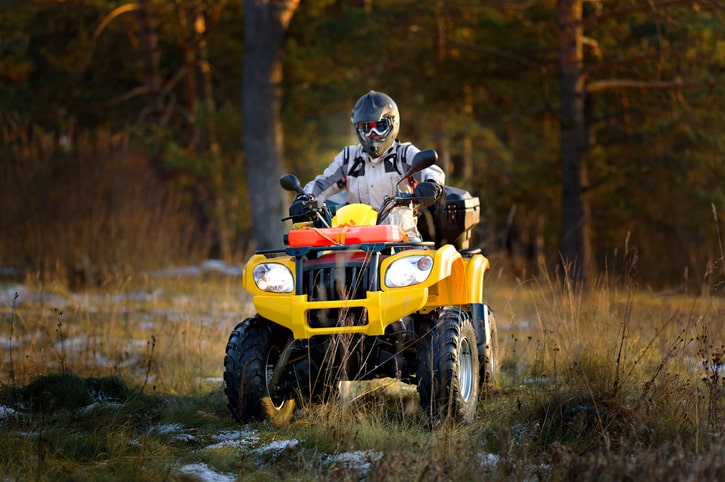
The American poet Robert Frost wrote “Two roads diverged in a wood, and I – I took the one less traveled by, and that has made all the difference”. While these words illustrate the benefit of facing and surmounting challenges, so too do they reflect the need for vigilance when operating off-road vehicles. In this blog, I will review the law related to off-road vehicles, safety requirements and recommendations, and legal rights and responsibilities so that when you take the road less traveled, your journey will be as safe as it is enjoyable.
The Law: Off-Road Vehicles
Off-road vehicles (ORVs), when driven off-road (not on a “highway” as defined by the Highway Traffic Act) are governed by the Off-Road Vehicles Act. The Off-Road Vehicles Act defines an ORV as a vehicle which is propelled (not driven by muscular power or wind) and designed to travel on three wheels or, if part of a prescribed class of vehicle, four wheels.
When you operate an ORV in Ontario, you must register it with the Ministry of Transportation and have a valid, rear licence plate attached to it except in exempt regions such as far Northern Ontario (additional exemptions can be found in Ontario). You are also required to have motor vehicle liability insurance for your ORV.
The Off-Road Vehicles Act further requires that: the driver of an ORV be at least 12 years of age, unless supervised by an adult or driving on land owned by the ORV owner; a driver of an ORV who is less than 16 years of age, or does not hold a valid driver’s licence (G1, M1, or greater), is not permitted to cross a highway; when operating an ORV the driver must carry the registration permit and the driver and passengers of an ORV must wear approved helmets which are securely fastened.
Possible Injuries Resulting From Off-Road Vehicles Use
Given the lack of traditional road safeguards, off-road travel is more hazardous and, as a result, any injuries can be severe. Such potential injuries include: head and brain injuries (lacerations, bruises, concussions and significant trauma); neck and spinal injuries (whiplash, nerve damage, fractures to the vertebrae and paralysis), torso injuries (internal bleeding, fractured ribs, impalement and internal organ damage) and injuries to arms and/or legs (fractures, sprains and strains).
Safety Recommendations
As with driving a motorcycle, ORV operation requires a heightened level of concentration, responsibility and awareness of potential hazards. It is imperative that your physical and mental states are not compromised in any manner whatsoever. You must not drive an ORV if you are sick, tired, injured, mentally unstable, or impaired. As the Ministry of Transportation states, “[ORVs] can offer hours of enjoyment for outdoor enthusiasts, as long as you obey the law and follow safety precautions.” Below is a list of safety requirements and recommendations for operating an ORV.
Maintenance and Inspection: Review and be familiar with your ORV operator’s manual. Undertake a thorough inspection of your ORV before your operate it. Be sure to check the tires (proper tire pressure; condition of the tire tread – look for worn or uneven tread, bulges and cracking) and damage to the tread, such as cuts or punctures. Check control system – ensure that all pedals, levers and switches are in good working order, brakes – test the brakes multiple times; cables – look for broken strands, kinks, or binding; lights – check the functioning of the headlight and any other lights; liquid levels (fuel, oil, and other fluid levels) to ensure that your ORV is in good working condition. Continue to undergo regular maintenance over the seasons of use.
Gear and Apparel: The Off-Road Vehicles Act states that when operating an ORV (or traveling as a passenger) you must wear a helmet that complies with the regulations and that the chin strap of the helmet must be securely fastened under your chin. You must also wear protective clothing which fits well and does not have any parts which could become entangled in the ORV. It is also recommended that you wear goggles or an alternative form of eye protection.
Operation: Familiarize yourself with the terrain and trail before you set out. Be aware of and drive according to trail and weather conditions. Drive in designated off-roading areas only. Be exceptionally cautious when you turn, climb and descend hills, and when you cross obstacles or roads. ORVs tend to tip or flip easily. Do not drive beyond your ability and skill level. Maintain control of your ORV at all times. Whenever possible, drive with others and advise a relative or friend of your intended destination and anticipated time of return. Bring a medical kit and cell phone in case of emergency. Do not consume alcohol, narcotics, nor prescription medication that may make you dizzy or drowsy, or impair your ability to balance, steer, control speed and judge distances.
Legal Rights and Responsibilities
The Off-Road Vehicles Act states that the owner of an ORV is liable for injury or damage when another individual operates the ORV with the owner’s consent. This means that if you give permission to someone to operate your ORV and that person causes injury or damage, then you are liable for the other person’s damage or injury. If your ORV is not properly maintained or the operator is not given proper operating instructions you could be liable to the operator if they are injured.
If you are involved in an ORV accident and sustain a personal injury, you will be entitled to Statutory Accident Benefits (SABS) under your motor vehicle liability insurance policy. Like injuries arising from a car accident, the circumstances of the accident, the degree and extent of your injury, together with the associated recovery time, will help determine your eligibility for such benefits. However, if you acted recklessly or were impaired at the time of the accident, then it is likely that the levels of support and compensation to which you are entitled will decrease.
The ORV legal landscape can be as complex as the terrain and trails upon which ORV operators ride, so it is essential that you retain a lawyer who is an expert in this area of law if you are injured in or by an off-road vehicle. At Howie Sacks and Henry, we have the expertise to help you surmount the challenges of the road less traveled and the experience to provide you with the legal support you need.
For more information on the severe injuries that can result from off-road vehicles and associated claims, please contact HSH Founding Partner and personal injury lawyer Michael J. Henry at 416-361-0889 or mjhenry@hshlawyers.com.






